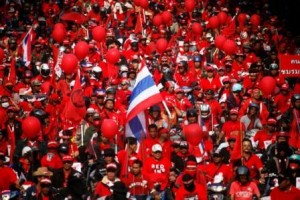Red Shirt Talks Signal Military’s Influence
More on:

Over the weekend, Thailand’s Prime Minister, Abhisit Vejjavija, besieged by street protests of the red-shirted supporters of former Prime Minister Thaksin Shinawatra, suddenly reversed his position and declared that he was open to direct talks with the reds’ leaders. (Abhisit previously had said he would not listen to any ultimatums for talks.) The red shirts immediately asked for the dissolution of Parliament, which presumably would lead to a new election that their party would have a strong chance of winning. Some media coverage suggested that these talks signified a breakthrough, a compromise that created the possibility of ending Thailand’s standoff, which in recent days has included bombings and grenade attacks.
But the talks actually signal something more ominous. As Bangkok’s The Nation notes, the compromise seems to have occurred because the red shirt protestors started marching to locations in Bangkok where army troops are temporarily garrisoned, raising the specter of a clash:
“Gen Pravit Wongsuwan, the defense minister, and Gen Anupong Paochinda warned Abhisit that he has to step forward to hold talks with the red shirts. Otherwise, the military would abandon their support of the Abhisit government.”
(Thanks to Bangkok Pundit for highlighting this quote)
In other words, if Abhisit did not talk to the protestors, the military would have thrown its support behind another coalition of parties that are Abhisit’s opponents. This is not any step forward; if Abhisit resolves the crisis, it is only a demonstration that the military still holds all of the most important levers of power and is capable of maintaining or ousting political parties as it wishes. As long as this is the case, Thailand will never return to the quality of democracy it enjoyed in the 1990s and early 2000s.
More on:
 Online Store
Online Store
